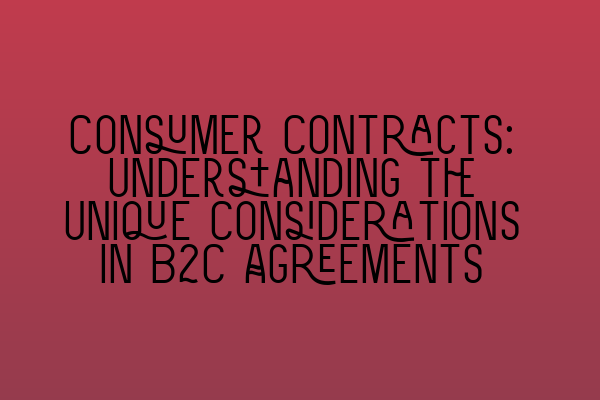Consumer Contracts: Understanding the Unique Considerations in B2C Agreements
Welcome to the blog of SQE Contract Law, where our team of expert solicitors, writers, and SEO professionals provide valuable insights into various aspects of contract law. In today’s post, we will delve into the world of consumer contracts and explore the unique considerations that arise in business-to-consumer (B2C) agreements.
Before we dive deeper into the topic, let’s define what a consumer contract is. A consumer contract is an agreement between a business (the seller) and an individual (the consumer) for the sale of goods, provision of services, or any other transaction in which the consumer is the end-user. These contracts are governed by specific laws and regulations to protect the rights and interests of consumers.
Key Elements of a Consumer Contract
When drafting a consumer contract, several essential elements need to be considered to ensure compliance with applicable laws and provide clarity to both parties. Let’s explore these elements:
1. Clear and Unambiguous Terms
A consumer contract should contain clear, concise, and easily understood terms. In many jurisdictions, there are strict requirements to prevent unfair terms that may disadvantage consumers. Clear and unambiguous language reduces the likelihood of disputes and improves consumer trust.
2. Consumer Protection Legislation
Consumer protection legislation varies from country to country, but it typically provides a framework within which consumer contracts should operate. It covers areas like consumer rights, warranties, cooling-off periods, cancellation rights, and more. Understanding and complying with these laws is crucial to avoid potential legal issues.
Learn more about legal challenges and pitfalls in navigating the complexities of the legal system.
3. Transparency in Pricing and Fees
In B2C agreements, consumers have the right to know the total cost of a product or service upfront. Any additional charges or fees must be clearly disclosed, including taxes, delivery costs, installation fees, or any other relevant expenses. Failure to provide transparent pricing information can lead to allegations of misleading or deceptive conduct.
4. Warranty and Guarantee Provisions
Warranty and guarantee provisions protect consumers by ensuring that the goods or services provided are of satisfactory quality and fit for their intended purpose. Businesses must clearly outline the terms and conditions of any warranties they offer to avoid potential disputes and maintain customer satisfaction.
5. Cooling-Off Period
In many consumer contracts, there is a cooling-off period during which the consumer can cancel the agreement without any penalty. This period allows consumers to reconsider their decision and provides an additional layer of protection for purchasers of goods or services.
Check out our article on The GDL (Graduate Diploma in Law) – A Pathway to Becoming a Solicitor.
Common Issues in Consumer Contracts
While consumer contracts are designed to protect consumers, several common issues can arise during the contracting process. Let’s explore a few:
1. Unfair Contract Terms
Unfair contract terms are provisions that give one party an unjust advantage over the other. These terms are typically deemed unenforceable and may expose businesses to legal consequences. Careful review and consideration of contract terms are essential to ensure fairness and adherence to consumer protection laws.
2. Misrepresentation or Deceptive Conduct
Businesses must avoid engaging in misrepresentation or deceptive conduct when advertising their products or services to consumers. Any false or misleading statements can lead to legal claims, damage the business’s reputation, and erode consumer trust.
Explore the importance of mentorship in nurturing talent in the legal field.
3. Non-Compliance with Consumer Protection Laws
A failure to comply with consumer protection laws can result in severe consequences for businesses, including fines, penalties, and legal action. It is crucial for businesses to stay up-to-date with evolving regulations and ensure their contracts are in line with current legal requirements.
4. Dispute Resolution Mechanisms
Consumer contracts should include provisions for dispute resolution, such as mediation or arbitration, to provide a clear path for resolving conflicts. Including these mechanisms enhances consumer confidence in the fairness and accessibility of the agreement.
Master the solicitor’s path with our tips on preparing for the journey ahead.
The Importance of Professional Legal Assistance
Given the complex nature of consumer contracts and the potential legal pitfalls, seeking professional legal assistance is crucial for businesses entering into B2C agreements. A qualified solicitor can provide expert advice, ensure compliance with consumer protection laws, and help draft contracts that protect the rights and interests of both parties.
Learn more about securing training contracts: A roadmap to becoming a solicitor.
At SQE Contract Law, our team of experienced solicitors has a deep understanding of consumer contract matters. We are committed to providing personalized guidance and support to businesses in navigating the complexities of B2C agreements.
If you require assistance with consumer contracts or any other contract law matter, reach out to SQE Contract Law today. Our team is ready to help you ensure your contracts are sound, compliant, and fair to all parties involved.
Stay tuned to our blog for more informative articles related to contract law and other legal topics. We’re here to equip you with the knowledge you need to succeed!
